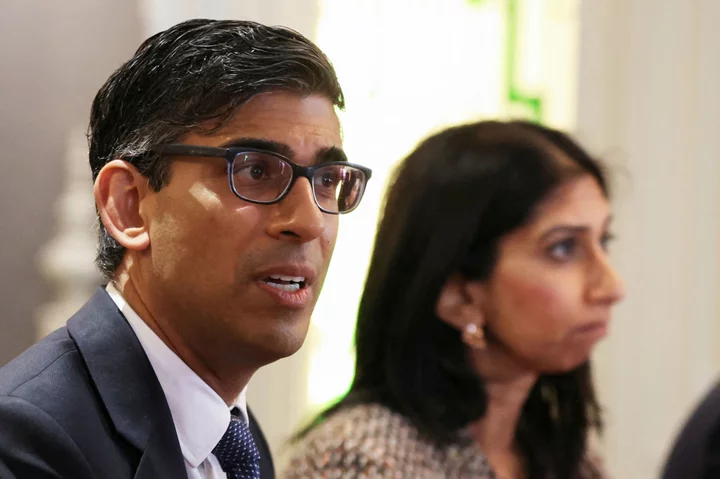The dilemma facing Rishi Sunak over his rebellious home secretary, Suella Braverman, dates back to his unlikely rise as Conservative Party leader just over a year ago. Their alliance — described by the opposition Labour Party as a “grubby deal” — effectively blocked Boris Johnson’s comeback bid and eased Sunak’s path to 10 Downing Street.
The controversy over Braverman’s re-appointment — she had been fired days earlier by beleaguered premier Liz Truss over a security breach — has dogged Sunak ever since. His aides spoke of her “purpose” in mollifying right-wing Tories, yet Braverman has always felt empowered to say what she thinks, and that has alienated more moderate voices Sunak also needs onside.
The pair have much in common, including Indian heritage, elite education and high-level careers before politics. They are socially conservative and agree with the Tory base on issues like cutting immigration. But whereas Sunak is technocratic and shows a reluctance to undermine institutions, Braverman’s power base is different and forged on attack lines. The target of her ire can be anything from the police to the “Guardian-reading, tofu-eating wokerati.”
Those competing factors will determine whether the relationship has finally reached the endgame. Braverman’s decision to accuse London’s Metropolitan Police of political bias wasn’t just not authorized by the prime minister; it also defied Sunak’s attempt to draw a line under the dispute over this weekend’s pro-Palestinian protest just hours after his talks with police.
For her detractors, the situation is clear: Braverman has undermined Sunak and exacerbated tensions ahead of a mass protest and likely counter-protests that could spill over into violence. And it’s not her first offense. In September, Sunak had to distance himself from her comments that British multiculturalism had “failed” and threatened security.
For Sunak, the situation is murkier. It’s not just that firing or reassigning her would anger her fanbase — that was factored into her appointment. A bigger risk for Sunak is the timing ahead of a court ruling next week. If he misjudges the events or they work against him, he could play into Braverman’s hands and leave the home secretary in a powerful position to challenge his authority.
The UK Supreme Court is set to decide on Wednesday on the legality of the government’s plan to deport asylum seekers to Rwanda — a measure championed by both Sunak and Braverman as they try to stem the flow of boats across carrying migrants across the English Channel.
If the court rules against the government, politicians on the Tory right are likely to ramp up demands for Britain to leave the European Convention on Human Rights. The UK court case is a separate issue, but is linked in the minds of some Conservative MPs because the Strasbourg court which oversees the ECHR has previously blocked the government’s Rwanda deportation flights.
The risk for Sunak is that if he keeps Braverman in place and the court rules against him, the home secretary could repeat her demand for the UK to leave the ECHR and threaten to resign if Sunak refuses. If the premier caved, he could split his party. The convention is written into the 1998 Northern Ireland peace treaty, making it a totemic issue for centrist Conservatives as well.
Privately, some Tory MPs suspect Braverman is using more provocative language because she wants to be fired. If she is kicked off the front bench for her forthright views, or resigns as a point of principle over the ECHR, that could effectively make her a martyr among right-wing Tories and put her in pole position for a leadership contest should Sunak lose the next general election.
Avoiding that outcome is a strong argument for Sunak to fire Braverman before the court ruling. That would also avoid accusations of weakness and indecision as the deliberations drag on.
“There would be a big row and a lot of fireworks but ultimately prime ministers tend to win those encounters because the home secretary would suddenly become the backbencher. She would quickly lose her purchase,” former Conservative Chancellor of the Exchequer George Osborne said on his Political Currency podcast on Thursday. “If you’re in Sunak’s position, you’ve got to keep thinking what are the maneuvers I can pull off that are going to change the political dynamic at the moment. The power to hire but also the power to fire is the real demonstration of prime ministerial power.”
On the flipside, Sunak could reason that it’s still better to have his rival within the Cabinet. The Supreme Court could rule in favor of the government, avoiding a potential flashpoint with Braverman. The prime minister will also have an eye on the pro-Palestinian march this weekend. If there is any violence, Braverman’s supporters will be out in force saying her warnings were correct, even as her critics will likely say she was responsible for inciting tensions.
Sunak and Braverman differ more on style and rhetoric than on actual policy, but few see his “full confidence” in the home secretary — issued by his office Thursday and Friday — as anything more than a holding statement as he mulls effectively the same dilemma as when he took office.
Whatever happens, the premier must now choose.

